Gotta grade them all!
Looking to grade your Pokémon cards but not sure what to look for? Whether you’re just starting your Pokémon collection or a seasoned expert, grading Pokémon cards can be a little confusing. Below is a list of the top 4 defects to look for when grading your Pokémon cards yourself.
Why grade Pokémon cards anyway?
Before submitting your cards to PSA for grading, you want to inspect and grade them yourself. There are many things to look for when grading your Pokémon cards. How smooth and crisp is the surface? Are the edges sharp? How about the centering on the front and the back? Is the holographic box free of any scuffs, scratches, or stains?
Increase the value of your collection
Having your cards encased by a third-party grading company, such as PSA, increases the value of your card significantly, as long as it grades well. You want to ensure your cards grade at least a PSA mint 9. There’s very little value gained when your card is encased in a near mint to mint PSA 8 case.
So, you want to thoroughly inspect your Pokémon cards before submitting them. I use all the right gear like a magnifying lamp or a jeweler’s loupe, to get my eyes as close to the cards as possible.
> > > Check out the supplies page for more grading and inspecting equipment.
PSA Pokémon examples
There is also a list with examples of actual Pokémon cards that have been graded below. I’ve shown a PSA 5 thru a PSA 10 for reference.
1. Surface Scratching
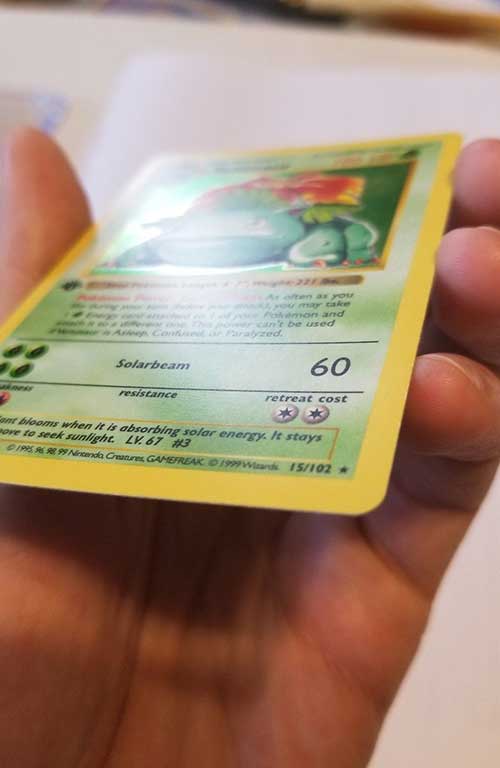
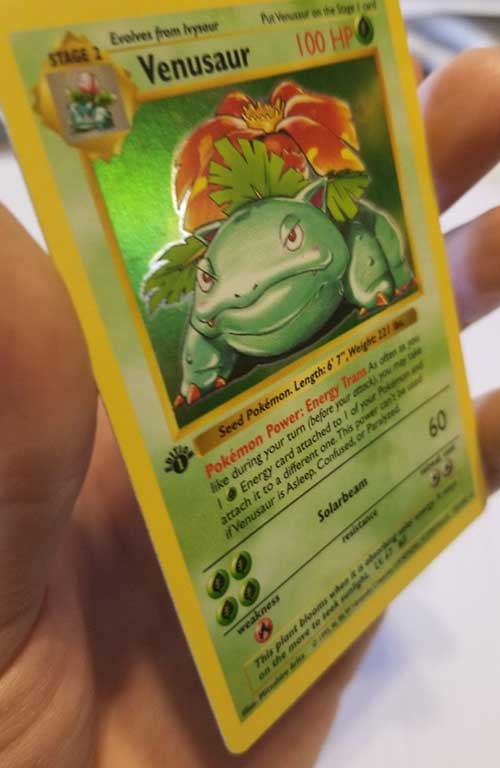
When grading Pokemon cards, you must take your time inspecting the front and back surfaces. There are many ways a card can have surface damage. Dings, dents, scratches, and even printing defects can demote the grade of your cards. Of all the defects, scratching seems to be the most difficult to look for.
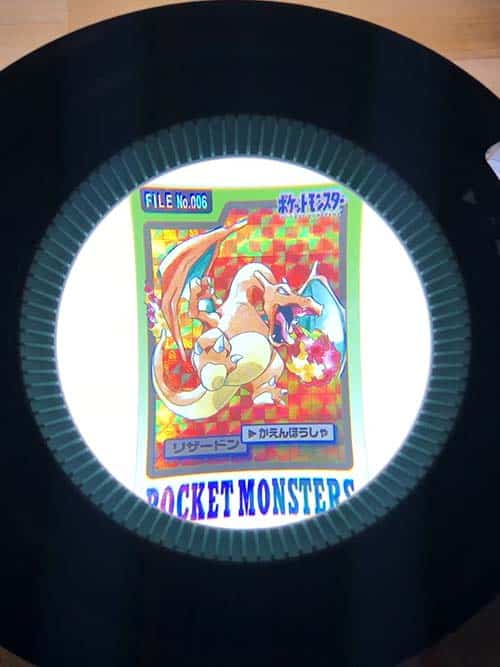
Inspecting the holographic box
Lots of light, a magnifying lamp, and tilting the card. Tilting the card at different angles in bright lights will allow you to catch micro scratches.
One of the most crucial grading flaws on the front of Pokemon cards is the condition of the holographic box. You need to inspect this area thoroughly. Any scratching will reduce your overall grade significantly.
When looking at the holographic, you need multiple light sources and a magnifying lamp. It will be difficult to find small scratches in low light with your naked eye.
Read more: the best magnifying lamps to use for grading your cards.
2. Border Centering
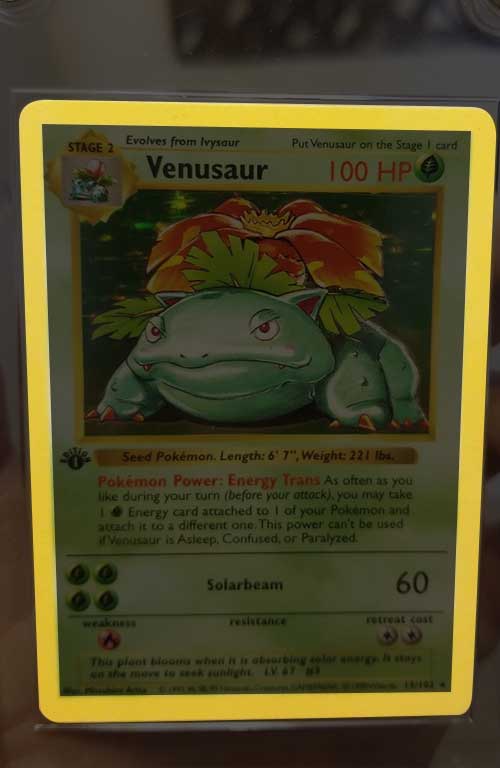
Evenly centered cards are more likely to receive higher grades. You must inspect the top, bottom, and left and right borders on the front and back.
How to grade centering?
One of the first things you should look for when grading Pokemon cards is how even or uneven the centering is. Ensure the same amount of yellow on all 4 sides for an evenly centered front. The back side requires an even amount of blue on all four sides.
3. Sharp Corners
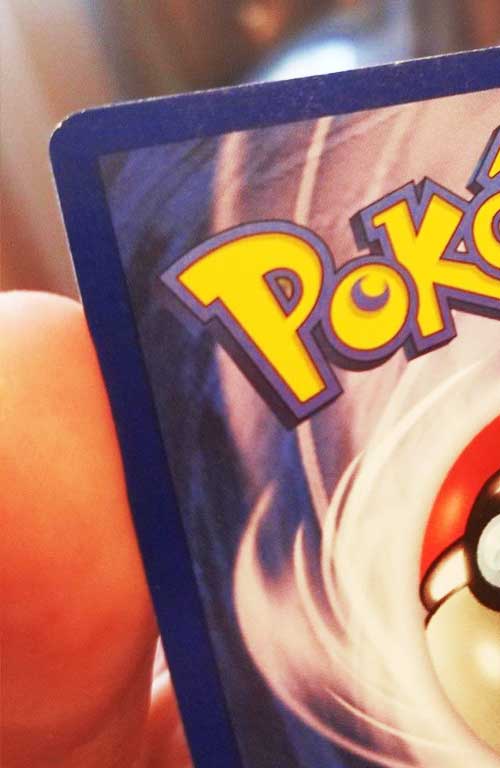
Corners can make or break a card. They need to be sharp and have a solid color. If the card you’re grading has been played, it will show. Soft edges with layering is evident in played cards. You do not want to send those cards in for grading.
How to grade the corners
Look for whitening on the back and front. You want as little white as possible. Having solid blue and yellow is ideal. Do not get discouraged. There are Gem Mint 10’s on the market with very minor whitening on a single corner. Don’t get your hopes up if there is any other issues with the card, though.
4. Solid Edges
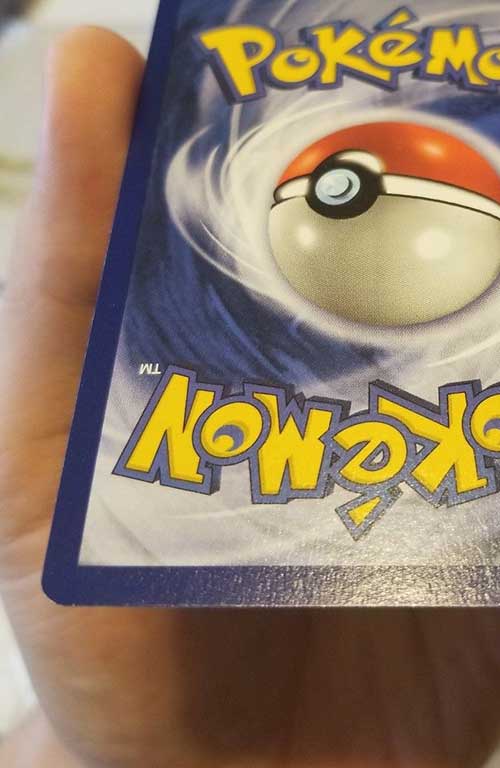
How to grade the edges
Edges need to be sharp and have a solid color. There shouldn’t be any flaking, whitening, dents, dings, or uneven color. If there is 1 minor error, you should still consider getting the card graded.
When inspecting the edges, use lots of light and consider using a magnifying lamp. A jeweler’s loupe works great as well. Inspecting the edges with the naked eye is done by seasoned Pokemon collectors because they know what to look for.
PSA Photo examples below
I did my best to adjust the settings of the photo examples below. This should allow you to see the minor details in the flaws and discrepancies of the card, like scratching, whitening, creased corners, and so on.
Hopefully, this article will give you a comprehensive understanding of what PSA looks for when grading Pokémon cards.
PSA 5
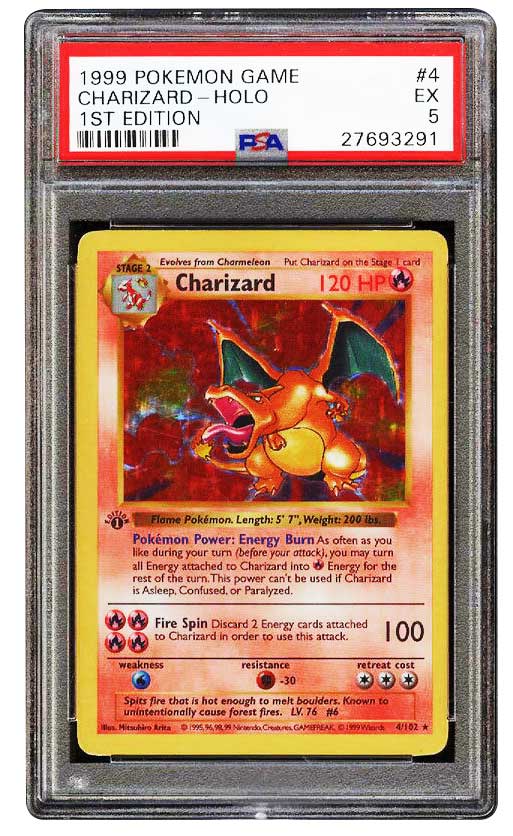
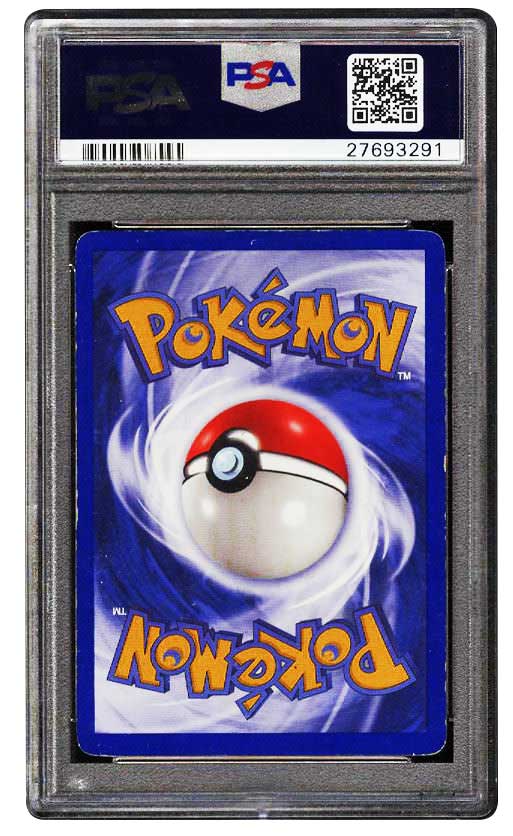
Recently sold Charizard PSA 5 $1,050
Front
Typically you’ll find scratches on the holographic pattern of the card around Charizard’s fire blast attack. There will also be a fair amount of whitening on the edges, some discoloration, and maybe a stain or two on the surface.
Back
Examining the back of the card is crucial when grading your Pokemon cards. You notice all that white on the borders without zooming in on the image above. This is a sure reason this card received a grade of 5 “excellent”. The whitening is evidence of frequent play time and use of the card.
PSA 5 Pokémon Cards
A PSA graded 5 pokemon card has noticeable damage to both the front and the back. So here you can see significant whitening and strong chipping on the left and right back sides.
Additionally, there’s consistent whitening across the border, with more significant chipping at certain spots. However, consistent whitening will be the main reason this card is limited to a PSA 5 grade.
If it had this whitening without the front blemishes, it probably more of a PSA 6 however, combining the front flaws with the back is why this car is a PSA 5 grade.
PSA 6
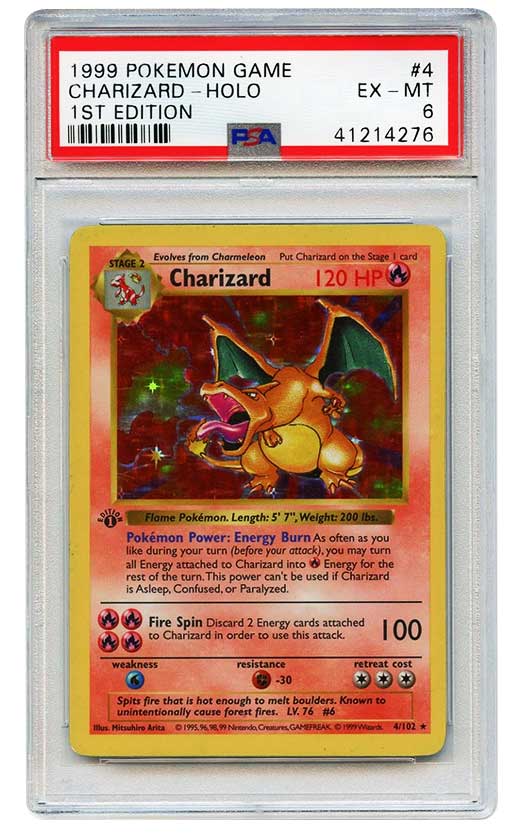
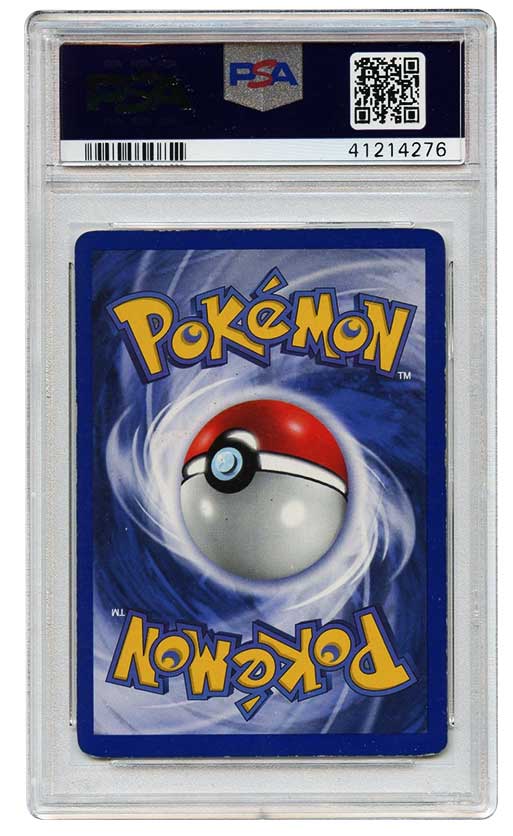
Recently sold Charizard PSA 6 $1,400
Front
A PSA 6 has a pretty solid-looking front. If you look at the scan, it’s difficult to find any noticeable errors. One flaw to look for is creasing in the corners. In the scan above, the bottom left corner has a slight crease, which is evidence of play time. Other than that, the front looks great. So why such a low grade?
This points out how important it is to inspect the back of the card.
Back
When grading the back of this card, it’s an entirely different story. It has consistent whitening on the right and bottom borders, similar to the PSA 5. The whitening is not as pronounced, but it still has consistent whitening.
PSA 6 Pokémon Cards
PSA 6 and PSA 5 graded Pokemon cards share many similarities. They both look like they’ve been tossed in a shoe box and have had lots of playtime. If your cards look like they’ve been used and stored by a kid, then prepare for a lower grade.
Don’t give up on them, though! Some are still worth grading even with lower grades.
PSA 7
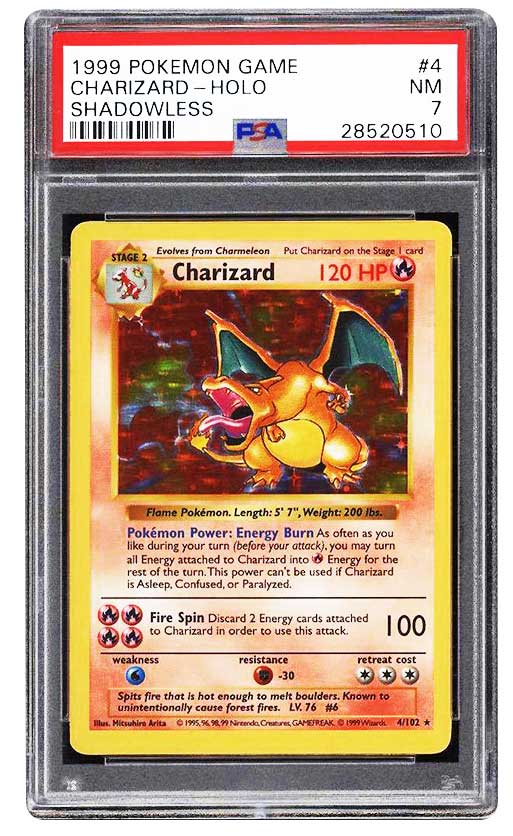
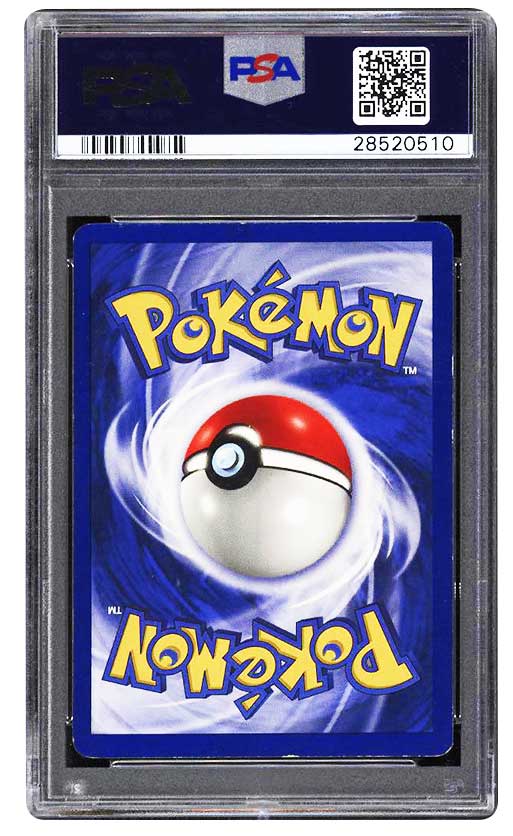
Recently sold Charizard PSA 7 $2,200
Front
A PSA 7 front is going to start to “pop.” The holographic pattern shows little to no wear. This 7 has a strong front. Great color, a smooth surface, sharp corners, and decent centering. The main issue is going to be the back.
Back
There is a fair amount of whitening on the back. It is not as prominent as the 5 and 6, but it’s still noticeable. All four corners show minor whitening and the right side has heavier chipping than the left.
PSA 7 Pokémon Cards
PSA 7’s are the higher-end cards that have been played. They have been taken out of the pack and maybe shuffled around or played a few times. Their playtime hours are not as extensive or frequent as the 5’s and 6’s, but they more than likely have been played. Compared to the lower grades, a 7 surely shines but not as brightly as the 8, 9, and 10’s.
PSA 8
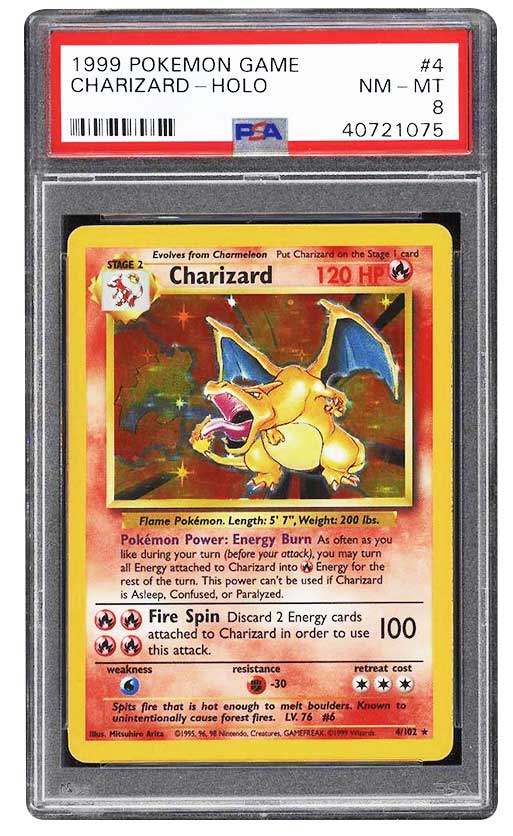
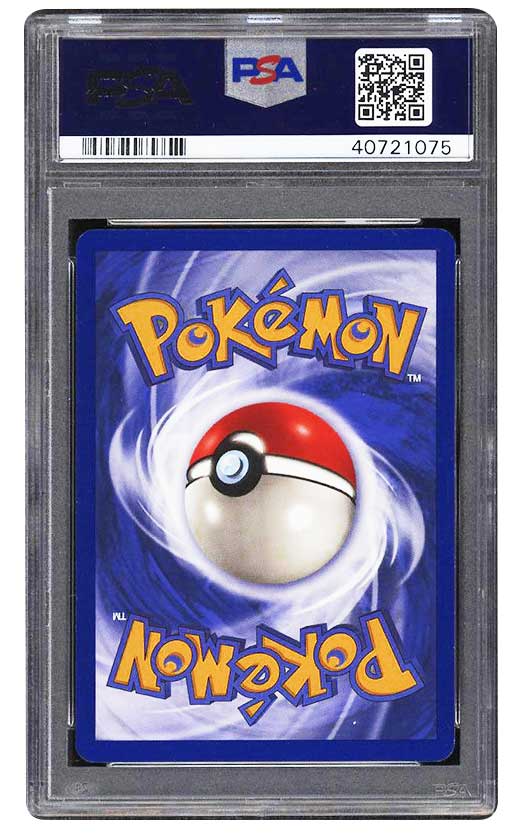
Recently sold Charizard PSA 8 $3,650
Something to note about the PSA 8, 9, and 10’s. These cards are typically cards that have been pulled straight from the pack. They have never been played. Holographic prints on these cards will be very vibrant and have zero scratches. White chipping on the borders will almost be non-existent.
Front
The eight is where you start to see strong grades and weak grades. I mean that this is a great example of a strong eight. Some cards sit between grades sometimes. So this card could probably be a borderline 9.
I believe it’s a strong 8 because if you look at the front, the only flaw is that left centering; you see, it’s a bit smaller there on the left, still within nine parameters. However, when we look at the back, there isn’t much whitening.
Back
Looking at the back of this card will show that this is a pack fresh card. There is very minor whitening here, very microscopic that’s very small. However, evidence of whitening isn’t necessarily a sure sign to get a PSA 8. However, this is a great example of a strong 8 and a week 9.
PSA 8 Pokémon Cards
More specifically, this is a great card you could send to PSA for review. It would be a great candidate to upgrade to a 9 grade because some cards sit between grades. Finding PSA 9 cards inside a PSA 8 case and vice versa will be fairly common in the current Pokemon market. There is just too little to see with the naked eye. If you want a closer look, check out my article on the best magnification lamps to grade your cards with.
PSA 9
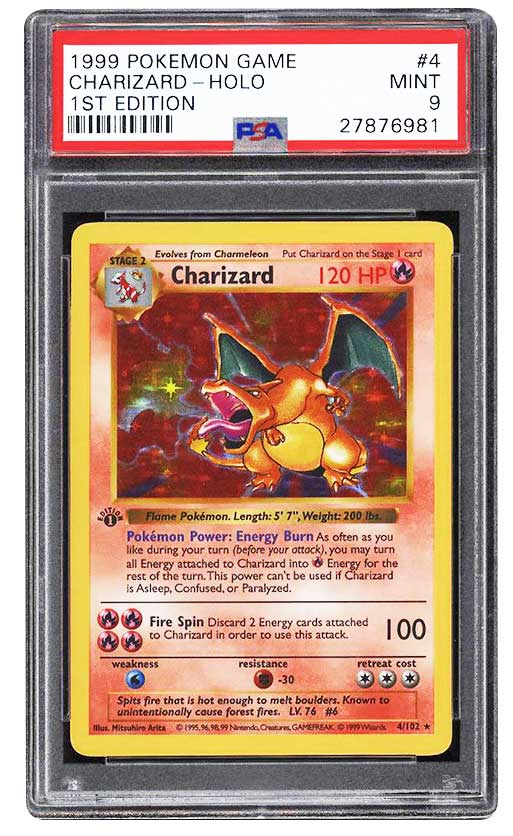
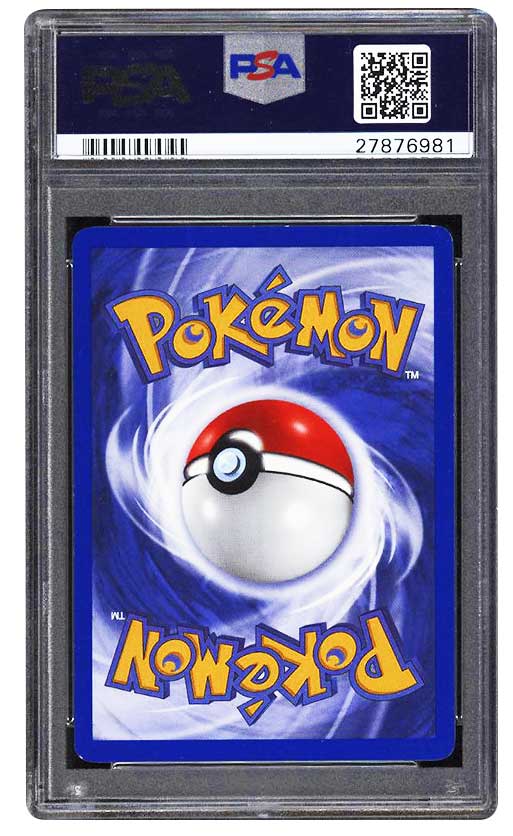
Recently sold Charizard PSA 9 $4,900
Front
So a mint card can still have a minor defect or a bit of whitening and this Charizard is a great example of flawless front. You could see right away that the holographic pattern is very vibrant. Much more vibrant than in the five, six, or seven. The centering is almost dead even. Zero whitening on all four corners. This is a borderline gem mint 10.
Back
When you go to the back, you’ll notice the two white parts on the top of the card. There is also a white blemish in the bottom right corner. Even though the front was pristine, the 3 noticeable white spots on the back of this card demoted it to a mint 9.
PSA 9 Pokémon Cards
There’s a lot to discuss with a nine. First of all, there’s a reason why PSA made the mint grade 9 instead of 10. Mint means a truly unused and untouched example of an item or card. And that is why this card received a 9 grade. The 10 grades are truly a “gem” example of a mint card.
PSA 10
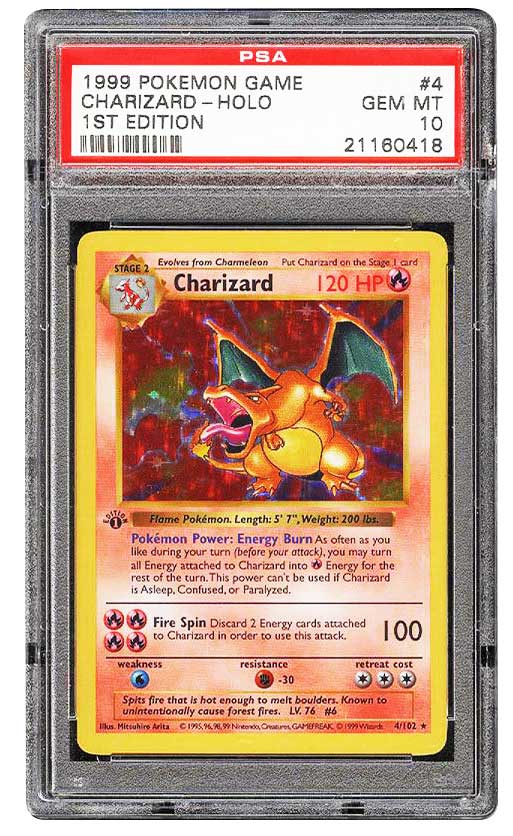
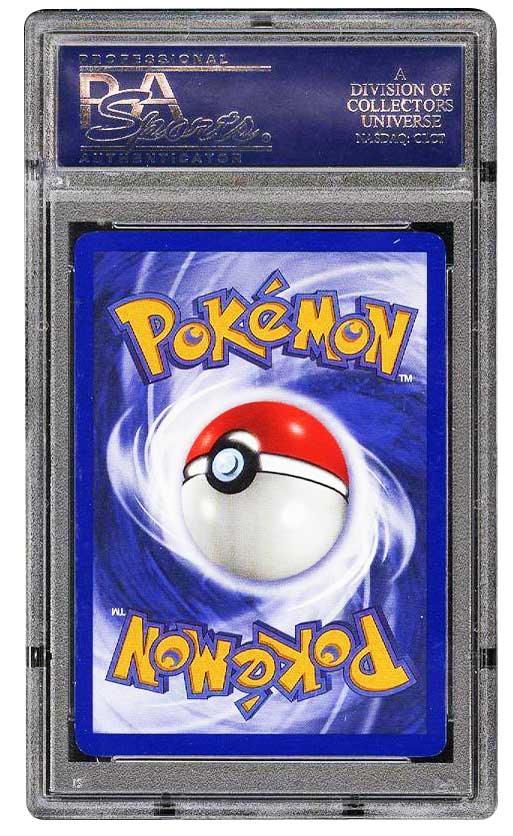
Recently sold Charizard PSA 10 $26,000
Front
A gem mint 10 card is truly a flawless card. The front has strong, bright colors with 50/50 borders on all four sides. The edges are crisp and show no wear whatsoever. Charizard’s fire blast holographic section has zero scratching.
Back
For the most part, gem mint 10 cards have no whitening on the backs. That is why it’s so difficult to land a 10 grade. The backs are extremely important to Pokemon card collectors; too many, it’s a deal breaker if there is evident whitening on the corners or sides.
PSA 10 Pokémon Cards
Pokemon cards that receive the gem mint 10 grade are straight from the pack into a penny sleeve and top loader. They have never been played or handled. Even pulling them from packs in gem mint condition can prove very difficult.
From a young age, Matt dove deep into sports card valuation, turning to esteemed price guides like Beckett and Tuff Stuff. Eventually he extended to Pokémon, Magic: The Gathering, and Yu-Gi-Oh!. With a vision to sustain and nurture the hobby he loved, Matt established the ‘Graded Card Investor’ YouTube channel and website. He aims to foster a healthy community and offer invaluable insights to those entering the world of sports cards and TCGs. His depth of understanding, from the card market’s 2020 pinnacle to its 1990s valleys, is consistently fortified by meticulous research.
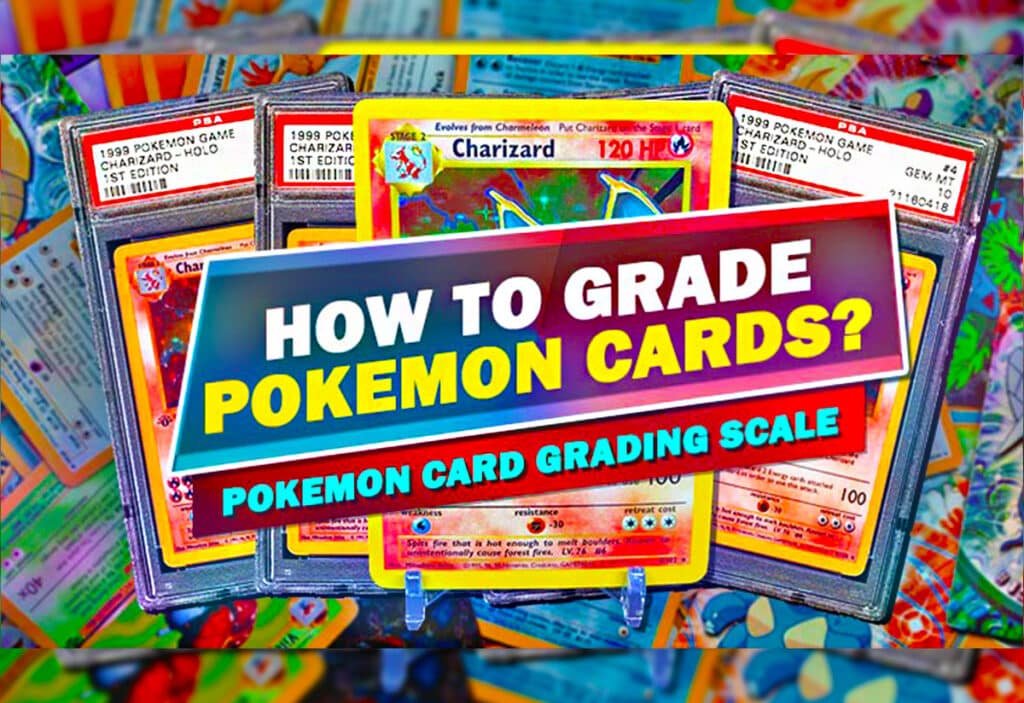
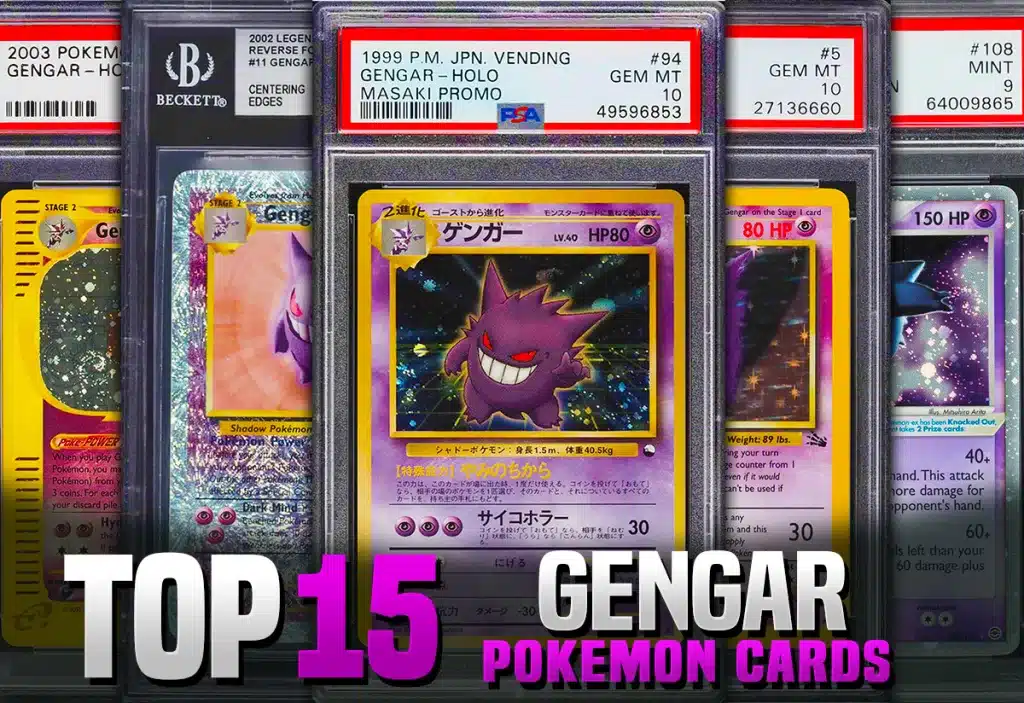
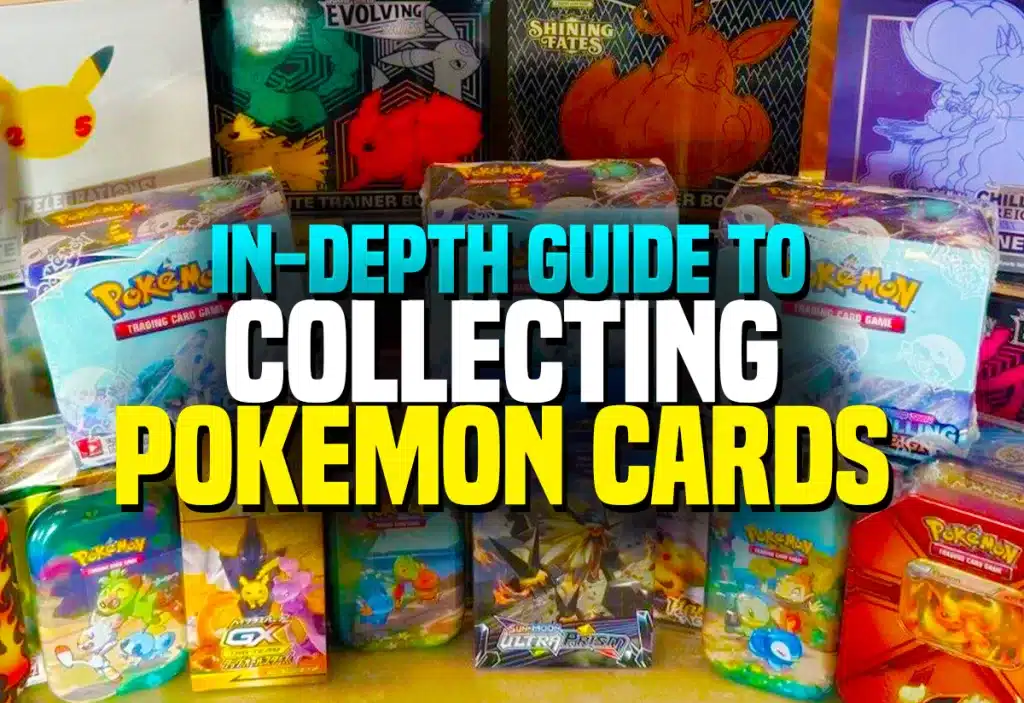
thank you
thank you
Pingback: Best Place to Sell Pokemon Cards: Top 10 Cash Buyers! - Right Lore
Pingback: Best Place to Sell Pokemon Cards: Top 10 Cash Buyers! - Game Blog
this helped a lot